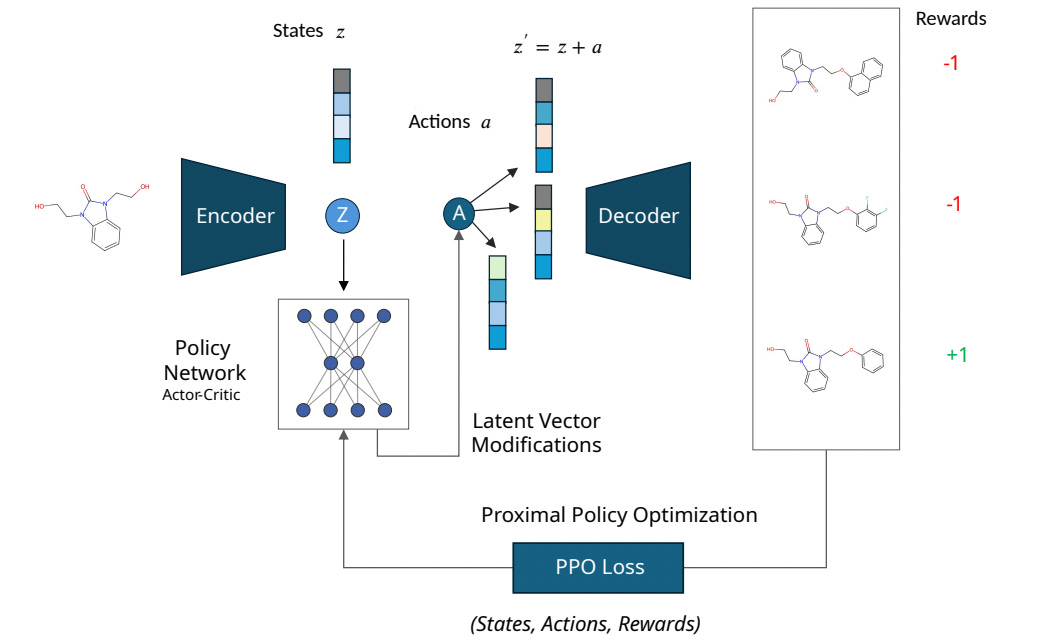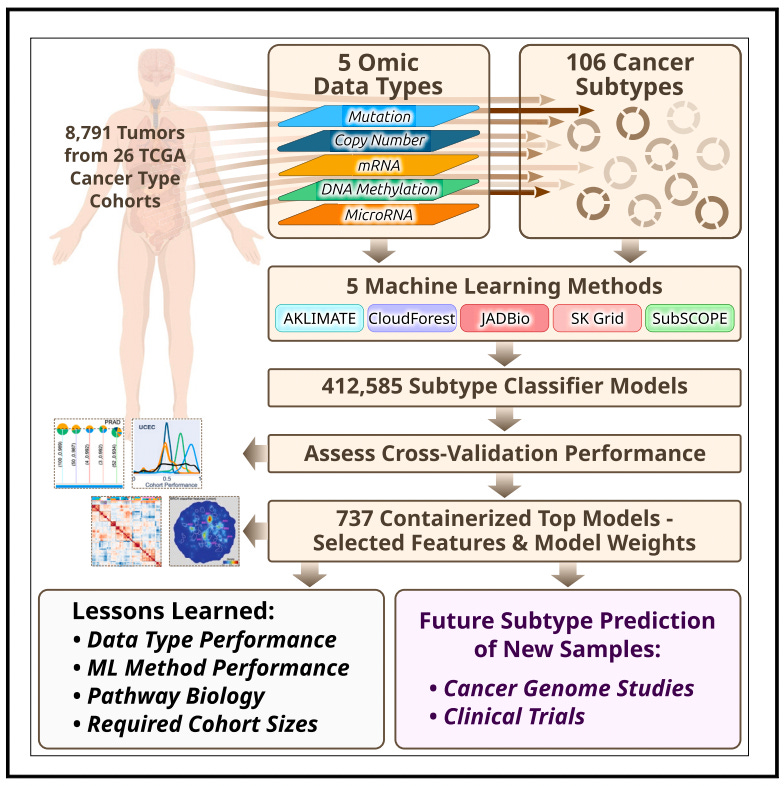📢 Highlights
New FDA draft guidelines to boost the credibility of AI in drug development
NVIDIA and Cellarity unveil a latent-space framework for scalable molecular design
Roche inks $1 billion deal with Innovent for ADC targeting small-cell lung cancer
Not yet a member of our super awesome slack community of >8500? Join HERE 🤗
👀 In Case You Missed it ..
FDA Proposes New Framework For AI in Drug Submissions
The FDA has proposed a draft framework for integrating AI tools into drug development. The move bolsters the credibility and regulatory alignment of AI/ML models used in drug and biological product submissions, emphasizing key principles such as data provenance, explainability, and reproducibility, to ensure these tools meet rigorous safety and efficacy standards and outlines regulatory expectations for ensuring that AI algorithms are well-documented, explainable, and validated across diverse clinical datasets. This is especially critical for predictive models used in patient stratification, trial design, and real-world evidence generation. Notably, the FDA also seeks stakeholder feedback on how to refine these guidelines, paving the way for wider adoption of AI technologies in regulatory pathways.
Targeted molecular generation with latent reinforcement learning
This newly released preprint from Cellarity, Inc. and NVIDIA presents MOLRL (Molecule Optimization with Latent Reinforcement Learning). This method combines trained generative models with the reinforcement learning algorithm PPO (Proximal Policy Optimization) to optimize molecular structures in latent spaces, bypassing predefined chemical rules. The framework supports single—and multi-objective optimization tasks and scaffold-constrained molecule design, achieving high property optimization, diversity, and novelty. MOLRL leverages autoencoder-based latent spaces and ensures high validity and continuity, offering a valuable tool for advancing computational drug discovery.
Behind the Deal: Roche’s Next Big Step in Transformational Cancer Therapies
Roche has reinforced its leadership in antibody-drug conjugates (ADCs) through a $1 billion biobucks deal with Innovent Biologics for global rights to IBI3009, a DLL3-targeted ADC. The agreement includes $80 million upfront, with milestone payments tied to research and sales, highlighting Roche’s focus on advancing its oncology pipeline. ADCs are a key growth area for Roche, offering the precision of monoclonal antibodies combined with the potency of cytotoxic drugs. IBI3009, now in phase 1 trials, targets DLL3, a protein overexpressed in small-cell lung cancer—a high-need area with limited treatment options. Roche’s strategy involves co-developing the candidate with Innovent in early stages, then leveraging its global expertise for further development and commercialization. This deal complements Roche’s recent ADC investments, including its $2 billion pact with Moma Therapeutics and $1 billion biobucks agreement with MediLink. Innovent, a trusted partner from a $2 billion collaboration in 2020, strengthens Roche’s access to ADC expertise and the Chinese market. For Roche, this partnership aligns with its strategy to dominate the high-growth oncology sector by targeting innovative therapies like IBI3009, ensuring long-term leadership and sustained revenue potential.
Pfizer-PostEra Partnership Expands to $610M for AI Drug Discovery
PostEra has expanded its AI-driven drug discovery partnership with Pfizer to a total of $610 million. The collaboration focuses on leveraging PostEra’s generative chemistry platform to design and optimize small-molecule therapeutics. By combining AI-based synthesis predictions with Pfizer’s drug development expertise, the partnership aims to accelerate lead identification for traditionally undruggable targets. The expanded agreement includes milestone-based payments and reinforces AI’s role in de-risking early-stage R&D. PostEra’s platform has already demonstrated success in reducing cycle times for hit-to-lead optimization, underscoring its real-world efficacy of AI in medicinal chemistry use cases.
Recursion Advances Two AI-Discovered Oncology Drugs to Clinical Trials
Salt Lake City based BioAI heavyweight Recursion Pharmaceuticals has initiated clinical trials for two investigational oncology drugs identified using its AI-driven discovery platform. REC-3565, a selective MALT1 Inhibitortargeting hematologic cancers such as chronic lymphocytic leukemia (CLL) and B-cell lymphomas, and REC-4539 the first reversible and CNS-penetrant LSD1 inhibitor for small cell lung cancer. SCLC. Recursion's platform combines high-content cellular imaging, causal AI, and advanced in-house machine learning system to map the relationships between genetic perturbations and phenotypic outcomes across multiple human diseases, leveraging over 60 petabytes of proprietary data.
Classification of non-TCGA cancer samples to molecular subtypes with small feature sets
This study presents a framework for matching non-TCGA cancer samples into TCGA molecular subtypes using machine learning and compact feature sets. Five ML methods—AKLIMATE, CloudForest, SK Grid, JADBio, and subSCOPE—were applied to multi-omic data from 8,791 TCGA samples, encompassing 106 subtypes across 26 cancer cohorts. The approach reduces feature redundancy and enhances predictive accuracy. It introduces 737 publicly available models, validated on external datasets, to facilitate clinical and research applications. This work provides a scalable tool for personalized cancer diagnostics and therapeutic development by bridging the gap between subtype discovery and practical implementation.
Aviceda Biotherapeutics Raises $207M Series C for Geographic Atrophy Therapy
Cambridge-based Aviceda Biotherapeutics has raised $207 million in a Series C funding round to advance AVD-104, its lead candidate for geographic atrophy (GA). AVD-104 is a glycan-based nanoparticle designed to modulate the innate immune system, specifically targeting the overactivation of the complement cascade implicated in GA progression. The therapy has shown promising results in preclinical models, with Phase 3 trials expected to assess its efficacy and safety further. This funding also supports pipeline expansion into other inflammatory and age-related conditions, positioning Aviceda as a leader in the burgeoning field of glycobiology.
Reprogrammed CRISPR - Profluent Bio’s New AI Model For Gene Editing
Founded in 2022, the techbio startup Profluent Bio has unveiled an AI-powered model designed to optimize CRISPR-Cas systems for gene editing, integrating structural biology insights with experimental evolution, By redesigning the protein structure of Cas enzymes, Profluent has enhanced target specificity while reducing off-target effects, perhaps the most challenging dimension of therapeutic genome editing. These reprogrammed CRISPR systems are purportedly able to address applications across a wide range of cell types and disease contexts, including somatic gene editing for inherited disorders and multiplex editing where multiple genomic targets are modified simultaneously
🗓️ Upcoming BiB Events
See our handy dandy Lu.ma event calendar HERE, please RSVP so folks can plan accordingly!
Bits in Bio Reception @ JPM / SF Healthcare Week - January 15 at 6PM, location TBD
Thank you to Shantenu Agarwal, Beko Jang, Eti Sinha and the generous support from the AWS GenAI Loft!
Bits N Bio Philly Presents: Breath ‘n Nio - January 16, 2025 3:00PM Online
Thank you to AJ Adejare and Sahil Patel for organizing!
📰 Top Community Conversations
It's been quiet as folks have been off for the holidays - check out the BitsInBio Q&A channel to get your fix!
🏢 New Job Openings
Notable postings below - over 100 more on our community job board!
Chief of Staff at Align to Innovate
Computational Scientists at Axiom Therapeutics
Open Science Administrator at Align to Innovate
Scientific Content Marketer at Invert
Senior Machine Learning Scientist/Engineer – Biomolecular Design at Flagship Pioneering
Various Roles at SeqCoast Genomics
🙋 🙏 Community Asks
Feedback: How is the Newsletter doing? We’re trying different formats/content. In case the hyperlink above didn’t get your attention, maybe a bright orange button will!
Volunteer: Want to get involved with Bits in Bio, meet new members across the community, and learn about the ecosystem? We are looking for volunteers to help us create great content and manage the community.
🙏 Thank you for being a BiB Weekly reader!
We want to deliver what matters most in Bio AI and would love your feedback on how we can do better. Please weigh in as anon here or DM me directly!







